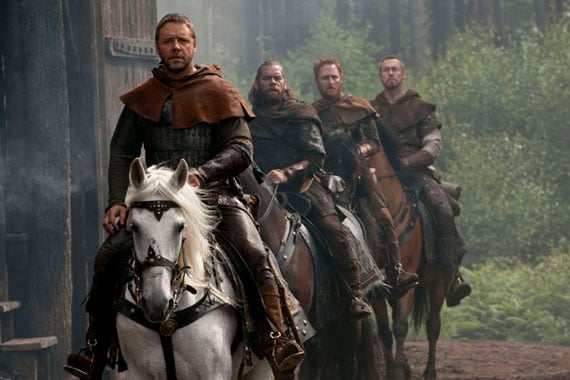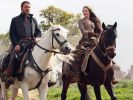Eye For Film >> Movies >> Robin Hood (2010) Film Review
Robin Hood
Reviewed by: Nick Da Costa

The Magna Carta - one of the most important documents in British history - was thought up by the father of Britain’s most enduring legend. At least, that’s what Ridley Scott’s bloated and ill-judged post-modernist slog through the early years of Robin Hood would have you believe. Rather than solidifying a myth by grounding it in history, it diminishes it, and worse, strips it of everything that made it entertaining.
The plot is a series of serendipitous moments meant to build a sense of momentous destiny, but, in fact, they engender confusionand eventually apathy. Crowe plays Robin Longstride, a longbowman in the army of Richard the Lionheart (Danny Huston, showing more personality than our hero), returning home from the Crusades and indulging in much pillaging of French fortresses along the way. An errant crossbow bolt, empty coin purses, a treacherous ambush in a forest and a dying man’s wish conspire to bring Robin and his companions to Nottingham and Loxley Hall.

There, the now widowed Marion Loxley (Cate Blanchett) and her father-in-law Sir Walter Loxley (Max von Sydow) observe the tyranny of the newly crowned King John (Oscar Isaac), who is foolishly taxing the country into civil unrest. It’s a decision he might regret, as a French invasion threatens to bring an end to his fledgling reign. Unless, of course, Robin can remember the teachings of history and reunite the fractious forces of Britain against this common enemy.
Exciting, non? But gone is the romp and the swashbuckle of previous iterations. In its stead is an hotchpotch of Braveheart’s political naivety, cod-Shakespearean rabble-rousing and wretched social realism. Not so much the dashing outlaw and his band of Merry Men. Think glum Union Steward and his embittered workers. They don’t take kindly to tyranny, but do like a drink, a few chords on the lute, a roll with a wench and then a game of darts. Except these darts are a little bigger and deadlier and fired with a bow that’s taller than most men.
Speaking of which, the Longbow is far from wooden in its performance. Thanks to some plain and precise direction from Ridley Scott, the opening siege is an exciting, albeit brief, demonstration of their devastating power when implemented swiftly. It’s a shame this wasn’t carried through to the rest of the film which moves as surely as the lame and weary, and is just as pallid in complexion.
Scenes such as Robin’s return down the Thames Estuary or his time at Loxley Hall, for all their meticulous period detail, lack energy and urgency. The final battle in the shadow of the Dover cliffs feels like an afterthought. As if it were hurriedly bolted on with no sense of rhythm or geography. Any thrills lost to the disorientation of close-up shakey-cam and slo-mo shots. They’re meant to be iconic - Robin, erupting from the surf, roaring like a lion - but interrupt, rather than being incorporated into, the flow of action.
This enervating atmosphere is carried through to the performances which are, on the whole, leaden. Writer Helgeland’s gift for ensemble casts and colourful supporting players seems absent. Blanchett brings her usual swan-like poise and adds Medieval moxie, but the spark between her and Crowe fizzles more than it ignites. The rest of the cast are disappointingly one-note. Oscar Isaac is a bellowing whelp; William Hurt a sly fox; Strong is duplicitous and bald; Matthew MacFayden a sunken-eyed opportunist; Max Von Sydow an animated octogenarian, and so on.
Which brings us to Crowe. It’d be easy to dismiss his performance as the worst. Instead of the sprightly rogue we expect, Crowe slumps sullenly into a chair, indifferent. His broad Northern accent turns what might be a stirring call-to-arms into a ponderous list of platitudes. In action, Crowe is one of the most believable actors working today, but when the tempo slows, which is often and frustratingly erratic, Robin’s steps feel like a plod. You long for the familiar forests. And then, right at the end, you get them.
The final scene has all the vitality, colour and comradeship the rest of the film lacks. In this emerald Eden we finally understand why Marion loves Robin and feel a genuine sense of adventure. It also proves, once again, the celebrated words from John Ford’s Who Shot Liberty Valance; a masterpiece that illuminated myth rather than concealing it: "When the legend becomes fact, print the legend." Wise words, especially if you mean to entertain and not bore your audience to tears.
Reviewed on: 14 May 2010




















